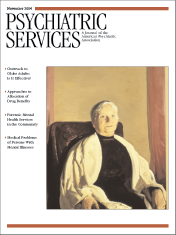A Systematic Review of the Effectiveness of Community-Based Mental Health Outreach Services for Older Adults
Abstract
OBJECTIVES: Psychiatric outreach services that provide mental health assessment and treatment to older adults in their homes or communities are widely promoted as improving access and outcomes for older adults. However, a systematic review of the efficacy of these services has not been done. This review evaluates the evidence base for the effectiveness of outreach services for older adults with mental illness in noninstitutional community settings. End points of interest include the ability of the outreach program to increase access to mental health services and improve psychiatric outcomes. METHODS: MEDLINE, CINAHL, PsycINFO, and Web-of-Science databases were searched for articles in English that were indexed through May 2004. Studies were included if they evaluated face-to-face psychiatric services provided to adults aged 65 and older with mental illness and if they were randomized controlled trials, quasi-experimental outcome studies, uncontrolled cohort studies, or comparisons of two or more interventions. Articles were excluded that evaluated interventions that were provided in institutional settings or that focused on persons with dementia or their caregivers. RESULTS: Fourteen studies matched all the inclusion criteria. Two studies (one controlled prospective study and one study that used a comparison group) found support for the use of gatekeepers—nontraditional referral sources—in identifying socially isolated older adults with mental illness. Twelve studies (five randomized controlled trials, one quasi-experimental study, and six uncontrolled cohort studies) found that home and community-based treatment of psychiatric symptoms were associated with improved or maintained psychiatric status. All randomized controlled trials reported improved depressive symptoms, and one reported improved overall psychiatric symptoms. CONCLUSIONS: Limited data supported the effectiveness of outreach services in identifying isolated older adults with mental illness. A more substantial evidence base indicated that home-based mental health treatment is effective in improving psychiatric symptoms. Studies are needed that apply more rigorous methods evaluating the efficacy of case identification models and subsequent treatment for older persons with a variety of psychiatric diagnoses.



